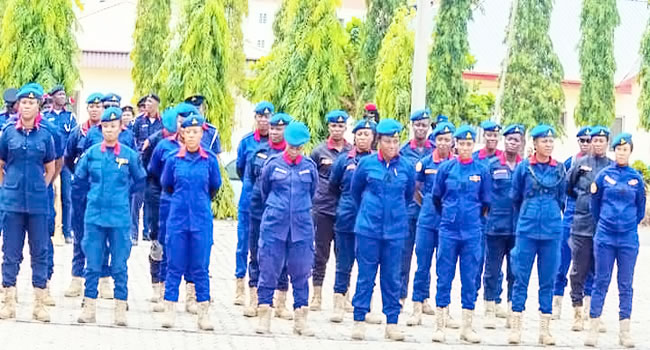CLEMENT IDOKO, in this piece, examines the role being played by the newly established female squad of the Nigeria Security and Civil Defence Corps (NSCDC) in tackling security challenges bedeviling the country, especially in the implementation of the Federal Government’s directive on safe school initiative.
THE Federal Government expanded the role of the Nigeria Security and Civil Defence Corps (NSCDC) to include deployment of personnel to protect schools and educational facilities following persistent attacks by bandits and insurgents. During such attacks, as the country has witnessed in the last few years, students and teachers were abducted and released after the payment of ransom. While some of such kidnapped students are still in captivity, a number of them who were not so lucky lost their lives in the process. NSCDC whose core mandate is to protect the nation’s critical infrastructure and has been involved in combating vandalism over the years, was charged to also tackle banditry and protect schools nationwide.
How well this role has been played is a matter of public debate with many commending the incumbent Commandant General of the NSCDC, Abubakar Audi for his foresight and proactive measures taken to actualise the corps’ mandate. Audi was appointed by President Muhammadu Buhari nine months ago, at the height of banditry and attacks on educational institutions in the country.
According to a report by the United Nations Children’s Fund (UNICEF), a total of 25 schools in Nigeria have been attacked, while 1,440 students have been abducted since January 2021. The report, published in November, was titled, ‘Children in West and Central Africa among those who suffer highest rates of grave violations in armed conflict’.
“In Nigeria, there have been 25 attacks on schools so far this year, with 1,440 students abducted. Nigerian children continue to suffer the impact of crisis. A protracted conflict has been raging in north-east Nigeria for 12 years now. Thousands of children in the region have been killed, maimed, abducted, displaced, and experienced multiple violations of their human rights,” the UNCEF report said while describing the development as unacceptable.
Concerned by this ugly development, Audi, on assumption of duty, commenced work immediately by carrying out a vulnerability survey of all schools in the country to determine the number of schools that are prone to attack by bandits and kidnappers so as to help in developing strategies for schools’ protection in Nigeria. He thereafter established a female squad towards enhancing security in schools susceptible to bandits’ attack in line with the Safe School Initiative of the Federal Government.
While different batches of the squad were trained at the national level and deployed to schools in some volatile states, the CG equally directed the state commandants to replicate the same in their various states of control.
Audi disclosed that his data showed a very high level of vulnerability of some schools in different parts of the country but expressed confidence that the data obtained from the survey he conducted has become a veritable tool for the corps in carrying out this assignment.
“Female squad is a child of necessity born out of the need to effectively curtail the recent upsurge of insecurity occasioned by armed banditry, kidnapping, insurgency and the need to effectively implement the government’s proposed safe school initiative.
“Recent upsurge and frequency of attacks by bandits who engage in kidnapping of students for ransom has made it imperative to focus attention on intensifying security in school environment.This is a proactive measure towards guaranteeing safety and restoring the confidence of students, parents, teachers and the community in the country’s security architecture,” he said.
Minister of Interior, Rauf Aregbesola commended the leadership of the corps for taking the lead in establishing a female squad as part of strategies to address the present security challenges confronting the nation.
Aregbesola who was at the passing out parade expressed delight over the initiative, saying that the move would no doubt add value to the security architecture of the country.
Speaking on the significance of women in the fight against terrorism, banditry, kidnapping and other forms of insecurity, Aregbesola reiterated that since women account for more than half of the nation’s population, it is very apt to include them in all aspects of nation building as studies have shown that women are more likely to attract the cooperation, confidence and trust of the citizens than their male counterparts.
He maintained that the spike in security challenges in the country occasioned by the activities of Boko Haram insurgency, armed banditry, robbery, kidnappings, farmers/herders clashes among others, necessitated the clamour for security agencies to redouble their efforts by strategising to provide a safe and secure environment, where meaningful development can thrive.
He assured the leadership of the corps of the President’s resolve to continue to enhance the capacity of the NSCDC to effectively deliver on its mandates through adequate funding and provision of modern security equipment.
Aregbesola urged the newly established squad to exhibit high level of discipline, focus, vigilance and mental alertness in discharging their responsibilities while calling on the citizens to provide operatives with actionable intelligence that will assist in finding lasting solution to the problem of incessant kidnapping of school children for ransom.
He noted that critical national assets and infrastructure are assets, services and systems that support the economic, political and social life of a nation. “They are so vital that the incapacity and or destruction of any may have a debilitating impact on security, economy, health, safety, education, food and agriculture, environment, transportation etc. You will agree with me that these are systems, assets or services which touch on the very fabrics of our existence as a nation,” he said.
In a similar vein, the Group Managing Director of the Nigerian National Petroleum Corporation (NNPC), Mele Kyari had disclosed recently that the corporation lost about N51.207 billion between 2019 to May 2021. He added that from January-May 2021, NNPC pipeline segments suffered 203 pipeline breaks with a total cumulative loss of 39 million litres amounting to N5.973bn.
Audi, however, said: “Our efforts have been yielding fruitful results which led to series of arrests, prosecutions and convictions. For instance, from January 2021 to date, the corps made 504 arrests with 463 under prosecution while 41 convictions have been secured. We can however perform better with additional funding and modern equipment, support from the Government and other critical stakeholders.”
Director, Public Relations of NSCDC, Olusola Odumosu confirmed that the Commandant General in keeping with his promise, paid over 150 families the outstanding burial benefits and entitlements of deceased personnel long forgotten before his appointment as the CG to the tune of N40 million while also working to pay the backlog of outstanding benefits of about 60 families to the tune of over N200m which has been lingering since 2013.
In recognition of the complementary role being played by private guards security companies in tackling insecurity in the country, the CG took bold steps to reposition and restructure them to serve in line with the globally acceptable standards because of the dynamics of crime and robust intelligence gathering function they perform. Audi has in the last nine months licensed 249 new private guards companies comprising 190 Category A and 59 Category B.
The renewal of the operating licence of the Private Guard Companies is annual and the Corps was able to renew 2,659 companies. 1,558 Category A and 1,101 Category B. However, in accordance with the Private Guards Company Act 367 LFN 1990 Section 11, Subsection 2 and subsequent approval of the Honorable Minister of Interior, the Corps was able to revoke 209 Private Guard Companies who failed to renew their operational license from five (5) years and above.
In his bid to fulfill the Federal Government’s avowed plan for food security in Nigeria and Borno State in particular through provision of physical security to farmers on their farmlands and protection of Agro-Allied investments, the Commandant General trained and deployed more Agro-Rangers personnel and created new Agro-Rangers Base station to expand the areas of coverage and boost farmers’ confidence. This, according to some stakeholders has resulted in the large turnout of farmers as well as the bumper harvest this year in some parts of the North.
WATCH TOP VIDEOS FROM NIGERIAN TRIBUNE TV
- Let’s Talk About SELF-AWARENESS
- Is Your Confidence Mistaken for Pride? Let’s talk about it
- Is Etiquette About Perfection…Or Just Not Being Rude?
- Top Psychologist Reveal 3 Signs You’re Struggling With Imposter Syndrome
- Do You Pick Up Work-Related Calls at Midnight or Never? Let’s Talk About Boundaries






